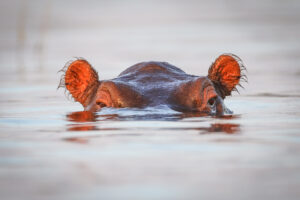Continue reading for our analysis...

Do you want to play “Spot the croc?” If so, this is the clip for you. For most of the footage, it is almost impossible to find the poor crocodile amongst the crush of hippos. Somewhere in the churned-up muddy water, there is a reptile in trouble! Finally, in the last couple of seconds, you see the crocodile’s body being flung unceremoniously out of the water.
Click below to see the hippos winning the battle of the muddy river!
Is It Normal Behavior For Hippos To Be Aggressive?

Hippos can be very territorial and aggressive!
©Martin Mecnarowski/Shutterstock.com
In a non-stressed state, hippos are typically gentle animals and pose no threat, particularly when provided with ample space and sufficiently deep water for submersion.
However, when the dry season begins with lower water levels and limited food sources, hippos tend to become more prone to aggression.
In the wild, when hippos encounter humans within their territory, their response is swift and intense.
Whether they’re peacefully soaking in the water or lounging in the savannah, hippos exhibit the same formidable aggression, charging at boats or jeeps with unwavering determination.
Furthermore, aggressive behavior is usually only seen when hippos are disturbed.
Do Hippos Eat Crocodiles?
The traditional view is that hippos are herbivores and eat only plant material. However, that is not the full picture. They have been observed occasionally feeding on animal carcasses which would make them omnivores.
Field studies have shown that they eat both the flesh and intestinal tissue of carcasses of other animals. We know that they eat wildebeest, impala, and crocodiles. This phenomenon is called carnivory and when it happens it is often the entire social group of hippos that do it at the same time.
Hippos can also be cannibals and eat the carcasses of other hippos. Sometimes the hippos come across the carcasses and other times they kill the animals themselves. This behavior may explain how anthrax outbreaks occur amongst the species.
Most of the time, they depend on vegetation growing near rivers and streams for their nutrition. Their diet is made up of mainly terrestrial plants and they only really consume aquatic plants even though they spent a lot of time in the water.
Are Hippos Territorial?
Yes, hippos are very territorial and do not like other animals in their patch of the river. They have taken an exception to the presence of the crocodile and are making sure that it is removed very quickly. They are also gregarious animals and live in groups.
Having said that, the herds are not fixed units and there is a lot of movement between groups. Herds of hippos usually contain between 10 and 15 individuals, but they can contain up to 50 hippos. Male hippos also defend their territory against other male hippos and this is connected with mating rights rather than with food.
Where hippos and crocodiles are living in the same area of water, hippos are the dominant species. They have been seen pushing crocodiles off a patch of land that they want to occupy. Hippos have also killed crocodiles that have strayed too close to calves. This croc had a lucky escape!
Thank you for reading! Have some feedback for us? Contact the AZ Animals editorial team.






